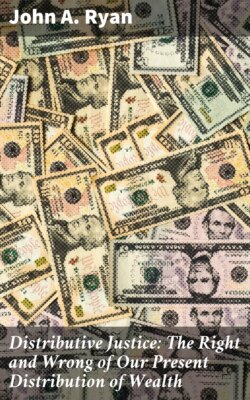Читать книгу Distributive Justice: The Right and Wrong of Our Present Distribution of Wealth - John A. Ryan - Страница 28
На сайте Литреса книга снята с продажи.
Private Landownership Indirectly Necessary for Individual Welfare
ОглавлениеTable of Contents
In our present industrial civilisation, however, private landownership is indirectly necessary for the welfare of the individual. It is said to be indirectly necessary because it is necessary as a social institution, rather than as something immediately connected with individual needs as such. It is not, indeed, so necessary that society would promptly go to pieces under any other form of land tenure. As we have seen in the last chapter, it is necessary in the sense that it is capable of promoting the welfare of the average person, of the majority of persons, to a much greater degree than State ownership. It is necessary for the same reason and in the same way as a civil police force. As the State is obliged to maintain a police force, so it is obliged to maintain a system of private landownership. As the citizen has a right to police protection, so he has a right to the social and economic advantages which are connected with the system of private ownership of land. These rights are natural, derived from the needs of the individual in society, not dependent upon the good pleasure of the city or the State. They are individual rights to the presence and benefits of these social institutions.
But man's rights in the matter of land tenure are more extensive than his rights with regard to a police force. They are not restricted to the presence and functioning of a social institution. Every citizen has a natural right to police protection, but no citizen has a natural right to become a policeman. The welfare of the citizen is sufficiently looked after when the members of the police are selected by the authorities of the city. On the contrary, his welfare would not be adequately safeguarded if the State were to decide who might and who might not become landowners. In the first place, the ideal condition is that in which all persons can easily become actual owners. In the second place, the mere legal opportunity of becoming owners is a considerable stimulus to the energy and ambition of all persons, even of those who are never able to convert it into an economic opportunity. Therefore, only a very powerful reason of social utility would justify the State in excluding any person or any class from the legal power to own land. No such reason exists; and there are many reasons why the State should not attempt anything of the sort. As a consequence of these facts, every person, whether an actual owner or not, has a natural right to acquire property in land. This right is evidently a necessary condition of a fair and efficient system of private ownership, which is in turn a necessary condition of individual welfare. The right of private landownership is, therefore, an indirect right; but it is quite as valid and quite as certain as any other natural right.
Now this right is certainly valid as against complete Socialism, which includes State management and use, as well as State ownership. Is it valid against the Single Tax system, or against such modified forms of Socialism as would allow the individual to rent and use the land as an independent cultivator with security of tenure? Would the introduction of some such scheme in a country in which only a small minority of the population were actual owners, constitute a violation of individual rights? While we cannot with any feeling of certainty return an affirmative answer to these questions, we can confidently affirm that reform within the lines of private ownership would in the long run be more effective, and, therefore, that the right of private ownership is probably valid even against these modified forms of common ownership.[36]
